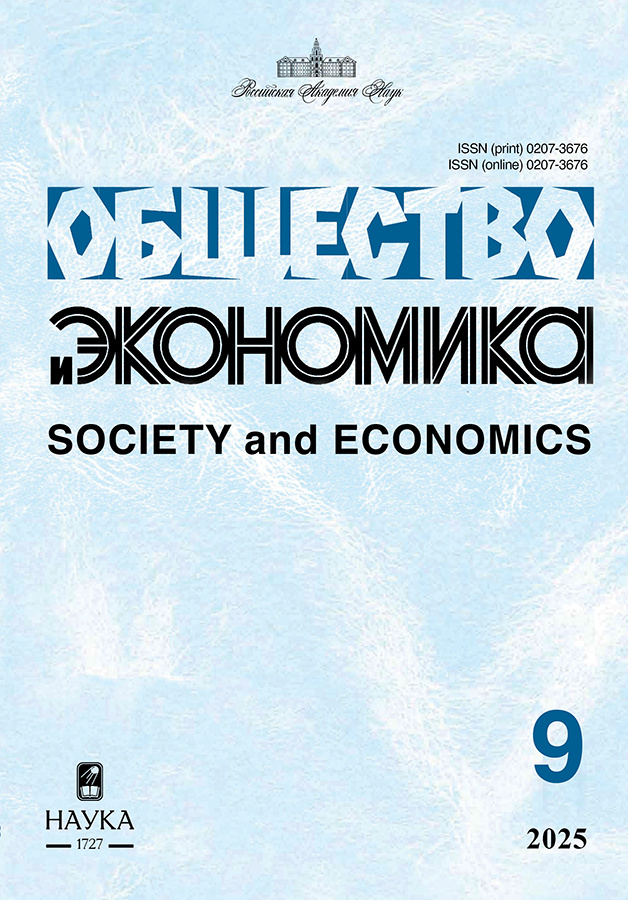Формирование цифровых компетенций населения на региональном уровне как социальная инновация: Псковская область
- Авторы: Стырин Е.1,2
-
Учреждения:
- Институт государственного и муниципального управления
- Национальный исследовательский университет «Высшая школа экономики»
- Выпуск: № 7-8 (2024)
- Страницы: 79-94
- Раздел: ВОПРОСЫ СОЦИАЛЬНОЙ СФЕРЫ
- URL: https://edgccjournal.org/0207-3676/article/view/674161
- DOI: https://doi.org/10.31857/S0207367624070055
- EDN: https://elibrary.ru/badcwg
- ID: 674161
Цитировать
Полный текст
Аннотация
В статье рассматривается состояние цифровых компетенций населения Псковской области, основанное на результатах интервью по тематикам: информационная безопасность, цифровые навыки, доверие и страхи в Интернете, образовательные возможности и повышение квалификации. Установлено, что при высокой самооценке цифровых навыков респонденты обладают лишь базовыми цифровыми компетенциями, у большинства интервьюируемых не хватает знаний об информационной безопасности, многие не следуют законам об авторских правах. Для решения проблем в статье предлагаются рекомендации по формату курсов развития цифровых компетенций, отвечающих принципам социальных инноваций.
Полный текст
Об авторах
Евгений Стырин
Институт государственного и муниципального управления; Национальный исследовательский университет «Высшая школа экономики»
Автор, ответственный за переписку.
Email: estyrin@hse.ru
кандидат социологических наук, заведующий Международной лабораторией цифровой трансформации в государственном управлении, доцент департамента политики и управления факультета социальных наук
Россия, Москва; МоскваСписок литературы
- Дмитриева Н.Е., Жулин А.Б., Артамонов Р.Е., Титов Э.А. Оценка цифровой готовности населения. Докл. к XXII Апр. междунар. науч. конф. по проблемам развития экономики и общества: Нац. исслед. ун-т «Высшая школа экономики». М., 2021.
- Зимняя И.А. Компетентность и компетенции в контексте компетентностного подхода. Доклад метод. семинара: Исследовательский центр проблем качества подготовки специалистов. М., 2015. С. 64–75.
- Симарова И.С., Алексеевичева Ю.В., Жигин Д.В. Цифровые компетенции: понятие, виды, оценка и развитие // Вопросы инновационной экономики. 2022. Т. 12. № 2. С. 935–948.
- Aben T.A., van der Valk W., Roehrich J.K., Selviaridis K. Managing information asymmetry in public–private relationships undergoing a digital transformation: the role of contractual and relational governance // International Journal of Operations & Production Management. 2021. P. 1145–1191.
- Agostino D., Arnaboldi M., Lema M.D. New development: COVID-19 as an accelerator of digital transformation in public service delivery // Public Money & Management.2021. Vol. 41. No. 1. Р. 69–72.
- Altayar M.S. Motivations for open data adoption: An institutional theory perspective. Government Information Quarterly. 2018. Vol. 35. No. 4. Р. 633–643.
- Alvarenga A., Matos F., Godina R., CO Matias J. Digital transformation and knowledge management in the public sector // Sustainability. 2020. Vol. 12. No. 14. Р. 5824.
- Asgarkhani M. Digital government and its effectiveness in public management reform: A local government perspective. Public management review. 2005. Vol. 7. No. 3. Р. 465–487.
- Asgarkhani M. E-service in the Public Sector. 2005.
- Botrić V., Božić L. The digital divide and E-government in European economies // Economic research-Ekonomska istraživanja. 2020. Vol. 34. No.1. Р. 2935–2955.
- Chatfield A.T., Reddick C.G. A framework for Internet of Things-enabled smart government: A case of IoT cybersecurity policies and use cases in US federal government // Government Information Quarterly. 2019. Vol. 36. No. 2. Р. 346–357.
- Chohan S.R., Hu G. Strengthening digital inclusion through e-government: cohesive ICT training programs to intensify digital competency. Information Technology for Development. 2020. P. 1–23.
- Chung C.S., Choi H., Cho Y. Analysis of Digital Governance Transition in South Korea: Focusing on the Leadership of the President for Government Innovation. Journal of Open Innovation: Technology, Market, and Complexity. 2022. Vol. 8. No.1.
- Clarke A. Digital government units: what are they, and what do they mean for digital era public management renewal? International Public Management Journal. 2020. Vol. 23. No.3. Р. 358–379.
- Gil-Garcia J.R., Dawes S.S., Pardo T.A. Digital government and public management research: finding the crossroads // Public Management Review. 2018. Vol. 20. No.5. Р. 633–646.
- Henderson D. Demand-side broadband policy in the context of digital transformation: An examination of SME digital advisory policies in Wales // Telecommunications Policy. 2020. Vol. 44. No.9. Р. 102024.
- Huang B., & Yu J. Leading Digital Technologies for Coproduction: the Case of “Visit Once” Administrative Service Reform in Zhejiang Province, China // Journal of Chinese Political Science. 2019. Vol. 24. No.3. Р. 513–532.
- Janowski T. Digital government evolution: From transformation to contextualization // Government information quarterly. 2015. Vol. 32. No.3. Р. 221–236.
- Katsonis M., & Botros A. Digital government: a primer and professional perspectives. Australian Journal of Public Administration. 2015. Vol. 74. No.1. Р. 42–52.
- Li X., & Ding Y. Holistic governance for sustainable public services: Reshaping government–enterprise relationships in China’s digital government context. International journal of environmental research and public health. 2020. Vol. 17. No.5. Р. 1778.
- Lindgren I., Madsen C.Ø., Hofmann S., & Melin U. (2019). Close encounters of the digital kind: A research agenda for the digitalization of public services // Government Information Quarterly. 2019. Vol. 36. No.3. Р. 427–436.
- Omar A., Weerakkody V., Sivarajah U. Digitally enabled service transformation in UK public sector: A case analysis of universal credit // International Journal of Information Management, 37. No.4. Р. 350–356.
- Pittaway J.J., & Montazemi A.R. Know-how to lead digital transformation: The case of local governments // Government Information Quarterly. 2020. Vol. 37. No.4. Р. 101474
- Qureshi I., Pan S.L., & Zheng Y. Digital social innovation: An overview and research framework // Information Systems Journal. 2021. Vol. 31. No.5. Р. 647–671.
- Rizza C. (2014). Digital competences. Encyclopedia of Quality of Life and Well-Being Research. 2014.
- Schou J., & Hjelholt M. (2019). Digitalizing the welfare state: citizenship discourses in Danish digitalization strategies from 2002 to 2015 // Critical Policy Studies. 2019. Vol. 13. No.1. Р. 3–22.
- SZ S.T., Saleem A., & Batcha M.S. Digital literacy awareness among Arts and Science college students in Tiruvallur district: A study // International Journal of Managerial Studies and Research. 2014. Vol. 2. No.4. Р. 61–67.
- Szambelan S., Jiang Y., & Mauer R. Breaking through innovation barriers: Linking effectuation orientation to innovation performance // European Management Journal. 2020. Vol. 38. No.3. Р. 425–434.
- Van Noordt C., & Misuraca G. Exploratory insights on artificial intelligence for government in Europe // Social Science Computer Review. 2022. Vol. 40. No.2. Р. 426–444.
- Walton G. (2016). “Digital literacy” (DL): establishing the boundaries and identifying the partners // New Review of Academic Librarianship. 2016. Vol. 22. No.1. Р. 1–4.
- Wong S.C. Competency definitions, development and assessment: A brief review // International Journal of Academic Research in Progressive Education and Development. 2020. Vol. 9. No.3. Р. 95–114.
- Woodruffe C. What is meant by a competency? // Leadership & organization development journal. 1993. Vol. 14. No.1. Р. 29–36.
Дополнительные файлы












